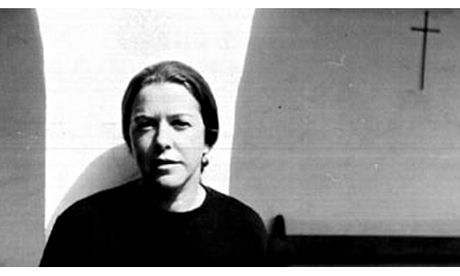
Sometimes I like to recommend the experimental, off-beat and avant garde. It's often a matter of simply letting people in on a secret: before the experiment is repeated, the off-beat becomes the beaten track and the garde catches up with its avant. I also like writing that falls into that subset of literature that only contains itself, which demands that you pay attention and realise you are in uncharted territory, where you must make up your own responses as you go along. With My Dog Eyes is very much that kind of book, and Hilda Hilst was very much the kind of writer to produce it.
I doubt you'll have heard of her: she's Brazilian and has only had one other novel translated into English, The Obscene Madame D. This is the interior monologue of a woman who has "eaten the body of God", and who, from a living space underneath the stairs, recalls in a stream-of-consciousness her dead father, her dead husband, and ... further paraphrase would be either useless or impossible.
In With My Dog Eyes we have a middle-aged man, Amós Kéres, a professor of mathematics, who is being asked to take a break from teaching because he has fallen into the habit of saying nothing for 15 minutes at a stretch. So far, so intelligible; but after a few pages – and there are only 59 of them in the whole work – we leave the pathways of conventional narrative. Let me give you a taste:
There are certain walls that should never be seen before we grow old: moss and ocher, dahlias across some of them, lacerated, sounds that should never be heard, pulsations of a lie, the metallic sounds of cruelty echoing deep down into the heart, words that should never be pronounced, hollow eloquences, the vibrations of infamy, the throbbing ruby-reds of wisdom.
If you think this sounds like the word salad produced by certain kinds of insanity, you'd be getting somewhere. Hilst's father was diagnosed with paranoid schizophrenia, her mother with dementia. Hilst herself, who had been a great beauty and socialite in her youth, began to write seriously by her 30s, eventually confining herself to isolation in her home built in coffee fields inherited from her parents. She devoted herself to literature, her dogs ("sometimes numbering more than one hundred," we're told in the introduction by the translator, Adam Morris), and, for "many years towards the end of her life, [spending] every evening getting drunk on cheap whiskey, drunk to the point of not remembering the things she said or the fights she provoked. 'I drink because it's the only way I can tolerate reality.'" Insanity, or a radically fractured view of her intolerable reality, is what her work both is, and is about; she revered Samuel Beckett and James Joyce, and considered herself to be carrying on their work. In that sense she could be said to have succeeded, as she makes the monologues in Beckett's The Unnamable and Molly Bloom's soliloquy at the end of Joyce's Ulysses look like models of linear, expositionary clarity.
This may all sound rather forbidding, and I wouldn't want to pretend that it's more reader-friendly than it is. There are few concessions to conventional understanding: we get flashes, but they are not comforting. This is a mind unravelling, and through the gaps we see a horrified fascination with the body, a kind of carnal awareness of existential futility. There's an epigraph from Georges Bataille that helps make sense of this: "I grasp while sinking that the sole truth of man, glimpsed at last, is to be a supplication without response." One rather admires as well as pities the translator, who won the Susan Sontag Prize for Literary Translation with a section from this book (although his translations of slang, like so many translations into American I've seen, sound overly dated).
So here you go: this is the heavy stuff, literature as an assault course, not for the impatient or faint-hearted, or those who suspect they're having their legs pulled. Look on it as not so much a novel as an extended prose poem, written from the edge.

